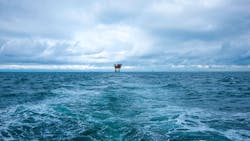Study assessing North Sea gas pipelines for CO2 transport
Offshore staff
KASSEL, Germany – Wintershall Dea is investigating whether gas pipelines in the southern North Sea could be converted for CO2 transport.
This is a collaborative study with the OTH Regensburg University of Applied Sciences in Germany. Results to date indicate that the pipelines could be safely and efficiently re-purposed for transporting liquid CO2.
Future steps planned include a technical feasibility test and certification.
Wintershall Noordzee, a joint venture between Wintershall Dea and Gazprom EP International, operates 1,200 km (745 mi) of the 4,800 km-plus (2,982-mi) network of pipelines in the southern North Sea, along with various depleted reservoirs.
Analysis suggests these could be suitable for storing CO2, with facilities on the Dutch continental shelf potentially converted to store around 800 MM t of CO2.
Klaus Langemann, senior vice president of Carbon Management and Hydrogen at Wintershall Dea, said his company was investing in carbon capture and storage (CCS) “because we are convinced that it is a safe and affordable technology for decarbonization.
“We have the technological know-how and the depleted offshore reservoirs required for CCS, as well as access to the pipeline network for transport.”
Using existing pipelines would also improve the economics of CCS projects, the company claims.
09/30/2021
